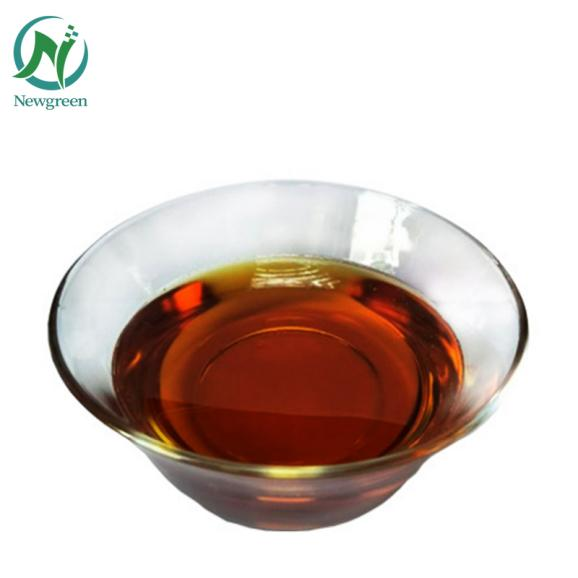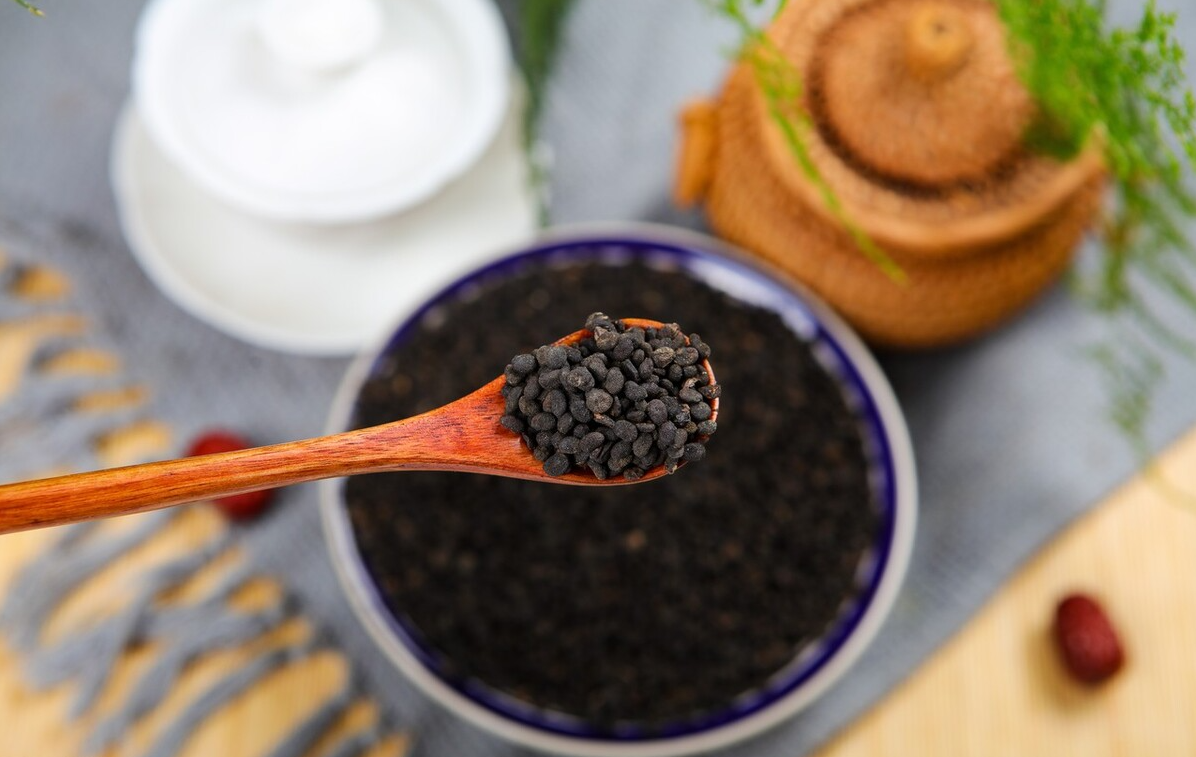● What Is Bakuchiol ?
Bakuchiol, a natural compound extracted from psoralea corylifolia seeds, has received widespread attention for its retinol-like anti-aging and skin care benefits. It has various effects such as promoting collagen synthesis, antioxidant, anti-inflammatory, soothing, whitening and antibacterial, and is suitable for a variety of skin care products such as anti-aging, whitening, soothing and anti-acne. Bakuchiol’s natural origin and low irritation make it an ideal ingredient in skin care formulas to provide comprehensive skin care benefits and enhance skin health and beauty.
● Physical And Chemical Properties of Bakuchiol
1. Chemical Structure
Chemical Name: Bakuchiol
Molecular Formula: C18H24O
Molecular Weight: 256.39 g/mol
Structural Formula
Chemical Structure: Bakuchiol is a monoterpene phenol with a structure that includes a phenolic ring and a prenyl side chain. Its structure is similar to that of resveratrol, another well-known antioxidant.
2. Physical Properties
Appearance: Bakuchiol is typically available as a liquid.
Color: It ranges from pale yellow to amber, depending on the purity and extraction method.
Odor: Bakuchiol has a mild, slightly herbal scent, which is generally considered pleasant and not overpowering.
Solubility in Water: Bakuchiol is not soluble in water.
Solubility in Organic Solvents: It is soluble in oils and organic solvents such as ethanol, making it suitable for oil-based formulations.
Melting Point: Bakuchiol has a melting point of approximately 60-65°C (140-149°F).
Boiling Point: The boiling point of Bakuchiol is not well-documented due to its decomposition at high temperatures.
3. Chemical Properties
Stability
pH Stability: Bakuchiol is stable across a wide pH range, typically from pH 3 to pH 8, making it versatile for various cosmetic formulations.
Temperature Stability: It is relatively stable at room temperature but should be protected from extreme heat and direct sunlight to prevent degradation.
Reactivity
Oxidation: Bakuchiol is prone to oxidation when exposed to air and light. It is often formulated with antioxidants to enhance its stability.
Compatibility: It is compatible with a wide range of cosmetic ingredients, including other active ingredients, emulsifiers, and preservatives.
4. Safety and Toxicity
Non-Irritating
Skin Tolerance: Bakuchiol is generally considered non-irritating and suitable for all skin types, including sensitive skin. It is often used as a gentler alternative to retinol.
Non-Toxic
Toxicity: Bakuchiol is non-toxic at typical usage levels in cosmetic formulations. It has been extensively studied and found to be safe for topical application.


● What Are The Benefits Of Bakuchiol?
Anti-Aging Properties
1.Reduction of Fine Lines and Wrinkles
◊ Collagen Production: Bakuchiol stimulates collagen production, which helps to improve skin elasticity and reduce the appearance of fine lines and wrinkles.
◊ Skin Firmness: By promoting collagen synthesis, Bakuchiol helps to firm and tighten the skin, giving it a more youthful appearance.
2.Antioxidant Protection
◊ Free Radical Neutralization: Bakuchiol has strong antioxidant properties that help to neutralize free radicals, which are responsible for premature aging and skin damage.
◊ Oxidative Stress Reduction: It protects the skin from oxidative stress caused by environmental factors such as UV radiation and pollution.
Skin Tone and Texture Improvement
1.Even Skin Tone
◊ Hyperpigmentation Reduction: Bakuchiol helps to reduce hyperpigmentation and dark spots by inhibiting the activity of tyrosinase, an enzyme involved in melanin production.
◊ Brightening Effect: Regular use of Bakuchiol can lead to a more even and brighter skin tone.
2.Smoother Skin Texture
◊ Exfoliation: Bakuchiol promotes gentle exfoliation, helping to remove dead skin cells and improve skin texture.
◊ Pore Minimization: It helps to minimize the appearance of pores, giving the skin a smoother and more refined look.
Anti-Inflammatory and Soothing Properties
1.Reduction of Inflammation
◊ Anti-Inflammatory Effects: Bakuchiol has anti-inflammatory properties that help to reduce redness, swelling, and irritation, making it suitable for sensitive and acne-prone skin.
◊ Calming Effect: It soothes the skin and helps to alleviate discomfort caused by inflammation.
2.Acne Treatment
◊ Antibacterial Properties: Bakuchiol has antibacterial properties that help to combat acne-causing bacteria, reducing the occurrence of breakouts.
◊ Sebum Regulation: It helps to regulate sebum production, preventing clogged pores and reducing the likelihood of acne formation.
Moisturizing and Hydrating
1.Enhanced Hydration
◊ Moisture Retention: Bakuchiol helps to improve the skin’s ability to retain moisture, keeping it hydrated and plump.
◊ Barrier Function: It strengthens the skin’s natural barrier, preventing moisture loss and protecting against environmental stressors.
Compatibility and Safety
1.Gentle Alternative to Retinol
◊ Non-Irritating: Unlike retinol, Bakuchiol is non-irritating and suitable for all skin types, including sensitive skin. It does not cause the dryness, redness, or peeling often associated with retinol use.
◊ Day and Night Use: Bakuchiol does not increase the skin’s sensitivity to the sun, making it safe for use both day and night.
2.Hypoallergenic
◊ Low Allergenic Potential: Bakuchiol is generally considered hypoallergenic and is less likely to cause allergic reactions compared to other active ingredients.
● What Are The Applications Of Bakuchiol?
Anti-Aging Products
1.Serums
◊ Anti-Aging Serums: Bakuchiol is commonly used in anti-aging serums to reduce the appearance of fine lines and wrinkles, improve skin elasticity, and promote a youthful complexion.
◊ Collagen-Boosting Serums: Formulated to enhance collagen production, these serums help to firm and tighten the skin.
2.Creams and Lotions
◊ Night Creams: Bakuchiol is often included in night creams to provide overnight repair and rejuvenation, reducing signs of aging while you sleep.
◊ Day Creams: Since Bakuchiol does not increase sun sensitivity, it can be safely used in day creams to provide all-day anti-aging benefits.
Brightening and Even Skin Tone Products
1.Brightening Serums
◊ Hyperpigmentation Treatment: Bakuchiol is effective in reducing dark spots and hyperpigmentation, making it a key ingredient in brightening serums.
◊ Even Skin Tone: These serums help to achieve a more even and radiant complexion by inhibiting melanin production.
2.Face Masks
◊ Brightening Masks: Bakuchiol-infused face masks provide an instant brightening effect, leaving the skin looking more luminous and even-toned.
Acne Treatment Products
1.Acne Serums
◊ Anti-Acne Serums: Bakuchiol’s antibacterial and anti-inflammatory properties make it effective in treating acne and preventing breakouts.
◊ Sebum Control: These serums help to regulate sebum production, reducing oiliness and preventing clogged pores.
2.Spot Treatments
◊ Blemish Control: Bakuchiol is used in spot treatments to target and reduce the appearance of individual blemishes and acne spots.
Moisturizing and Hydrating Products
1.Moisturizers
◊ Hydrating Creams and Lotions: Bakuchiol is included in moisturizers to enhance hydration, improve moisture retention, and strengthen the skin’s barrier function.
◊ Sensitive Skin Moisturizers: Its gentle nature makes it suitable for moisturizers designed for sensitive skin, providing hydration without irritation.
2.Facial Oils
◊ Nourishing Oils: Bakuchiol is often added to facial oils to provide deep nourishment and hydration, leaving the skin soft and supple.
Soothing and Calming Products
1.Soothing Creams and Gels
◊ Anti-Inflammatory Creams: Bakuchiol’s anti-inflammatory properties make it ideal for soothing creams and gels that calm irritated and inflamed skin.
◊ Post-Procedure Care: These products are used to soothe the skin after cosmetic procedures such as chemical peels or laser treatments.
2.Sensitive Skin Products
◊ Calming Serums and Lotions: Bakuchiol is included in products designed for sensitive skin to reduce redness, irritation, and discomfort.
Sun Care Products
1.After-Sun Care
◊ After-Sun Lotions and Gels: Bakuchiol is used in after-sun products to soothe and repair sun-exposed skin, reducing redness and inflammation.
2.Daily Sunscreens
◊ SPF Moisturizers: Bakuchiol can be included in daily sunscreens and SPF moisturizers to provide additional anti-aging and soothing benefits.
Eye Care Products
Eye Creams and Serums
◊ Anti-Aging Eye Creams: Bakuchiol is effective in reducing fine lines and wrinkles around the delicate eye area, making it a popular ingredient in eye creams and serums.
◊ Dark Circle Treatments: These products help to brighten the under-eye area and reduce the appearance of dark circles.
Hair Care Products
Scalp Treatments
◊ Scalp Serums: Bakuchiol’s anti-inflammatory and soothing properties make it beneficial for scalp treatments, helping to reduce irritation and promote a healthy scalp.
◊ Hair Serums
◊ Nourishing Hair Serums: Bakuchiol is included in hair serums to nourish and strengthen the hair, improving its overall health and appearance.
Related Questions You can Be Interested In :
♦ What are the side effects of bakuchiol ?
Bakuchiol is a natural compound that is generally well-tolerated and considered safe for most skin types. However, some individuals may experience mild skin irritation, allergic reactions, or interactions with other skincare ingredients. It is important to perform a patch test before extensive use and to introduce Bakuchiol gradually into your skincare routine. While Bakuchiol does not typically increase sun sensitivity, it is advisable to use sunscreen during the day to protect the skin from UV damage. Pregnant and breastfeeding women should consult a healthcare provider before using Bakuchiol-containing products. By being aware of these potential side effects and taking appropriate precautions, you can safely enjoy the benefits of Bakuchiol in your skincare routine.
Patch Test: Apply a small amount to a discreet area of skin and wait 24-48 hours to check for any adverse reactions.
♦ Is bakuchiol better than retinol?
The answer depends on individual needs and preferences:
For Sensitive Skin: Bakuchiol is generally better due to its lower risk of irritation and no increased sun sensitivity.
For Quick Results: Retinol may be more effective for those looking for faster and more dramatic anti-aging results.
For Pregnant or Breastfeeding Women: Bakuchiol is considered a safer alternative.
For Ethical and Environmental Concerns: Bakuchiol, being a natural and often cruelty-free option, may be preferable.
♦ What pairs well with bakuchiol?
Bakuchiol pairs well with a variety of other skincare ingredients, enhancing its benefits and providing comprehensive skincare solutions. Some of the best ingredients to combine with Bakuchiol include hyaluronic acid for hydration, vitamin C for brightening and antioxidant protection, niacinamide for anti-inflammatory and barrier-strengthening effects, peptides for collagen boosting, ceramides for barrier repair, squalane for moisturizing, and aloe vera for soothing and hydration. These combinations can be used in layered routines or found in combined formulations, making it easy to incorporate Bakuchiol into your skincare regimen for optimal results.
♦ How long does it take bakuchiol to work?
Bakuchiol is a gentle yet effective skincare ingredient that can provide visible improvements in skin texture, tone, and anti-aging benefits. Initial hydration and soothing effects can be noticed within the first couple of weeks. More noticeable changes in skin texture and brightness typically appear within 4-6 weeks. Significant reductions in fine lines, wrinkles, and hyperpigmentation can be observed after 8-12 weeks of consistent use. Long-term use over 3-6 months and beyond will yield the most substantial and sustained improvements. Factors such as skin type, product formulation, and consistency of use will influence the timeline and extent of results.
♦ What to avoid when using bakuchiol ?
1. Potentially Irritating Ingredients
Strong Acids
Alpha Hydroxy Acids (AHAs): Ingredients like glycolic acid and lactic acid can be quite potent and may cause irritation when used in conjunction with Bakuchiol.
Beta Hydroxy Acids (BHAs): Salicylic acid, commonly used for acne treatment, can also be irritating when combined with Bakuchiol.
How to Manage
Alternate Use: If you use AHAs or BHAs, consider alternating them with Bakuchiol on different days or using them at different times of the day (e.g., acids in the morning and Bakuchiol at night).
Patch Test: Always perform a patch test when introducing new products to ensure your skin can tolerate the combination.
2. Retinoids
Retinol and Retinoic Acid
Potential Overload: Using Bakuchiol alongside retinoids can potentially overload the skin, leading to increased irritation, redness, and peeling.
Similar Benefits: Since Bakuchiol offers similar anti-aging benefits to retinoids, it’s generally unnecessary to use both simultaneously.
How to Manage
Choose One: Opt for either Bakuchiol or a retinoid in your skincare routine, depending on your skin’s tolerance and specific needs.
Consult a Dermatologist: If you’re considering using both, consult a dermatologist for personalized advice.
3. Excessive Sun Exposure
Sun Sensitivity
General Precaution: While Bakuchiol does not increase sun sensitivity like retinol, it’s still important to protect your skin from UV damage.
Sunscreen Use: Always use a broad-spectrum sunscreen with at least SPF 30 during the day when using Bakuchiol.
How to Manage
Daily Sunscreen: Apply sunscreen every morning as the final step in your skincare routine.
Protective Measures: Wear protective clothing and avoid excessive sun exposure to maintain healthy skin.
4. Over-Exfoliation
Physical and Chemical Exfoliants
Potential Irritation: Over-exfoliating with physical scrubs or chemical exfoliants can compromise the skin barrier and cause irritation when combined with Bakuchiol.
Skin Sensitivity: Exfoliating too frequently can make the skin more sensitive and prone to irritation.
How to Manage
Moderation: Limit exfoliation to 1-2 times per week, depending on your skin type and tolerance.
Gentle Exfoliants: Opt for gentle exfoliants and avoid using them on the same days as Bakuchiol.
5. Harsh Cleansers
Stripping Ingredients
Sulfates: Cleansers containing sulfates can strip the skin of its natural oils, leading to dryness and irritation.
High pH: High pH cleansers can disrupt the skin’s natural barrier, making it more susceptible to irritation.
How to Manage
Gentle Cleansers: Use a gentle, sulfate-free cleanser with a balanced pH to maintain the skin’s natural barrier.
Hydrating Formulas: Opt for hydrating cleansers that support the skin’s moisture balance.
6. Incompatible Products
Layering Multiple Actives
Potential Overload: Layering multiple active ingredients can overwhelm the skin and increase the risk of irritation.
Product Compatibility: Not all active ingredients are compatible, and some combinations can reduce the efficacy of the products.
How to Manage
Simplify Routine: Keep your skincare routine simple and focus on a few key products that address your primary concerns.
Consult a Professional: If you’re unsure about product compatibility, consult a dermatologist or skincare professional for personalized advice.
♦ What percentage of bakuchiol is best?
The optimal percentage of Bakuchiol in skincare products typically ranges from 0.5% to 2%. For those new to Bakuchiol or with sensitive skin, starting with a lower concentration (0.5% to 1%) is advisable to minimize the risk of irritation. For more pronounced anti-aging, brightening, and soothing benefits, concentrations of 1% to 2% are generally effective and well-tolerated by most skin types. Always perform a patch test when introducing a new product and consider your specific skin type and concerns when choosing the right concentration. Consistent use as part of your daily skincare routine will yield the best results.
Post time: Sep-29-2024







